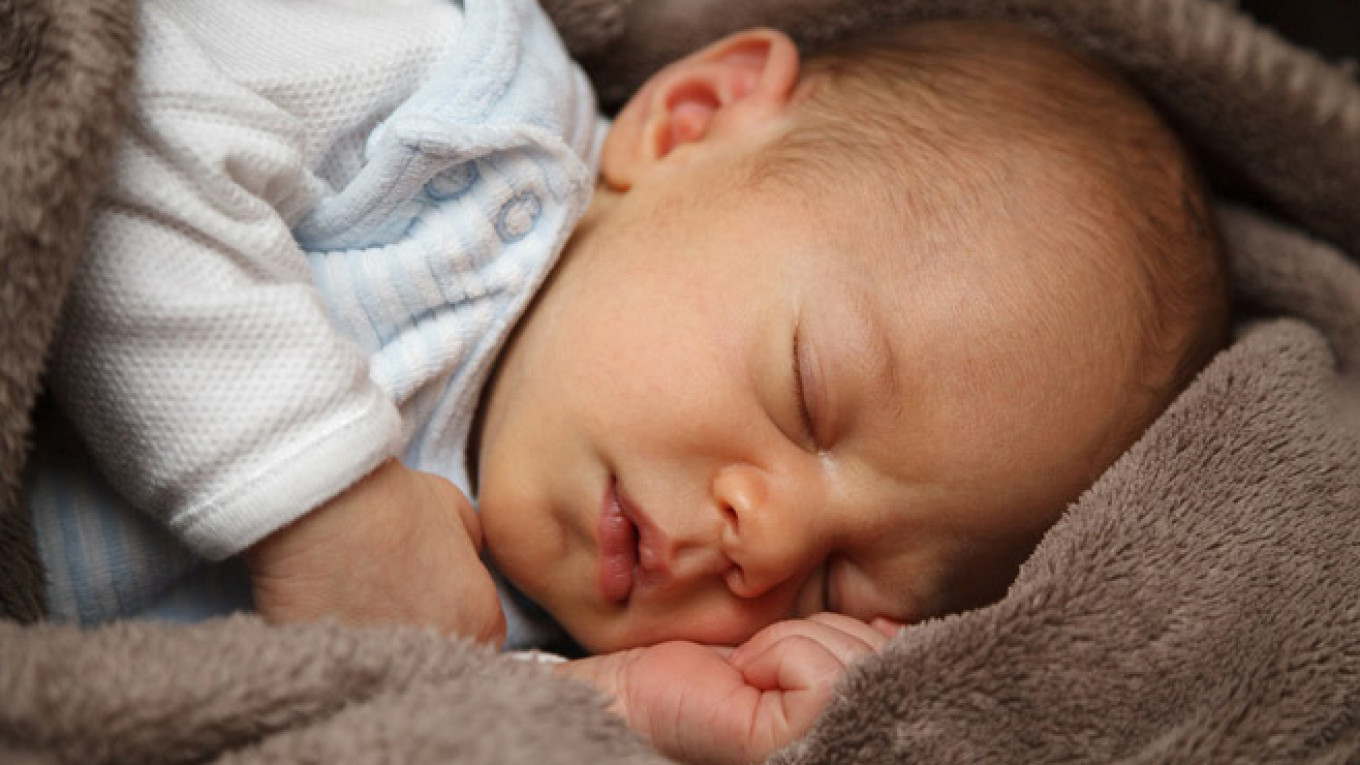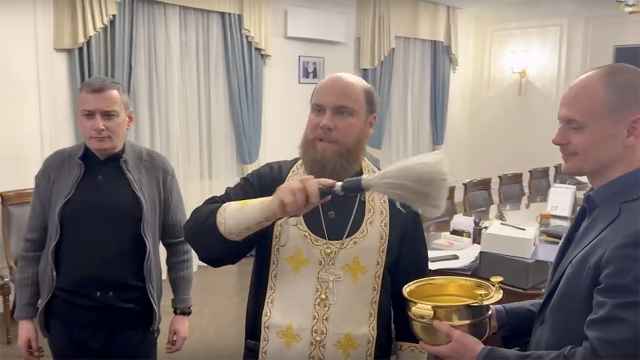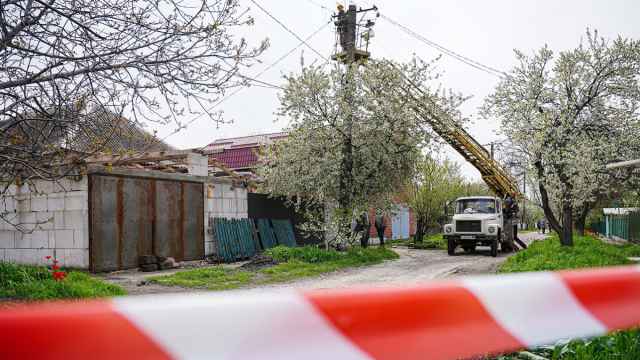Russia's expectant mothers sometimes face the unexpected. Double-digit inflation, instability at home and a lack of family support can plunge pregnant women into a mood of despair that is at odds with maternal instincts.
Incidents in which babies are simply abandoned in Russia, including during the frigid winter months, are a common occurrence. In January, a stray cat was credited with saving a 2-month-old in the town of Obninsk, southwest of Moscow. The cat climbed into the cardboard box in which the infant had been abandoned, sharing its body heat with the baby, and then meowed until it attracted the attention of a passerby. Another newborn was discovered in January in the Siberian town of Cherepanovo inside the entrance to an apartment building, where it had been left in a handbag.
For other abandoned babies, there is no miraculous rescue, and no happy ending.
Last month, Russian media reported that the corpse of a newborn baby still covered in placenta was found in a plastic bag at the bottom of a Moscow pond when the pond was being cleaned out.
Now advocates of baby boxes — incubator-type enclosures in which parents can leave an unwanted newborn, anonymously and without legal repercussions — are hoping to see them introduced to Moscow.
Between 2010 and 2013, the Interior Ministry recorded 532 infanticides, according to data published on Cradle of Hope's website. Yelena Kotova, founder of Cradle of Hope, the nongovernmental organization that introduced baby boxes to Russia in 2011, believes there are at least three times more infanticide cases than those reported to authorities.
Cradle of Hope, the only national organization of its kind, claims that since 2011, 31 newborns have been saved because of its 21 baby boxes — also known as baby hatches — located in 11 Russian regions.
Moscow authorities told the M24.ru news site earlier this week that they were reviewing Cradle of Hope's request to implement the project in some of the capital's hospitals. Moscow's deputy mayor for social development, Leonid Pechatnikov, said the idea would be discussed within the city's medical community.
Saving Lives
"We are not here to encourage parents to abandon their newborns," Kotova told The Moscow Times by telephone, speaking from her home city of Perm. "We are trying to safeguard two lives: the mother's and the child's. We are here to make sure that the mother doesn't become a criminal and that her child survives."
Kotova was mobilized by the story of Yelena Danilova, а 31-year-old resident of Perm who was charged with infanticide after firemen discovered the corpses of two newborns on the balcony of her burning home. Kotova said she wanted to take action against the desperation that had led Danilova to murder her children.
"Two weeks later, I heard there was something known as baby boxes in Latvia," Kotova said. "I made a trip there to have a look at how it was being done. There was nothing to it. I came back here and knew what I needed to start the project."
The concept of providing a safe means of abandoning children has existed in Russia since at least the time of Peter the Great, according to Kotova. Infants were abandoned on the front steps of churches in the hope that a good Samaritan would care for them. A modern, safer version of the practice was only introduced to the country with the creation of Cradle of Hope in 2011.
Help at Hand
Baby boxes are affixed to the wall of an existing medical facility. The area is devoid of surveillance cameras or security guards to protect the identity of the person leaving an infant there. Once a baby is deposited into the heated box, the metal latch that was used to open it automatically locks, preventing the box from being reopened from the outside. Some two minutes after a child is left in the box, an alarm goes off inside the medical facility to alert personnel.
The baby is then examined by a doctor, and police and social services are informed to ensure that the child left in the box had not been declared missing.
Since 2011, 25 of the 31 newborns left in Russia's baby boxes were put in the care of new families, three were returned to relatives within a week of being left there and three other infants are in the process of being adopted.
"We didn't just install baby boxes and leave things at that," Kotova said. "A sign containing contact numbers for mothers in distress hangs above every box. We provide the baby box but we also provide help to the mothers that resort to this option."
Every baby box contains a letter addressed to those abandoning a child, a measure Kotova said could help prevent parents from abandoning their baby in an impulsive fit of despair.
Prevention and Expansion
Last month, a newborn baby died after his 19-year-old mother abandoned him in a derelict building in the city of Sarapul in Russia's central republic of Udmurtia, where she had given birth to him. She now faces up to five years in prison for infanticide.
Kotova thinks cases like these can be avoided. But the closest baby box to Sarapul is located more than 400 kilometers away, in the Urals city of Yekaterinburg.
"We are trying to expand our project to 16 more regions," Kotova said. "In the meantime, we are trying to work on prevention, to urge women to give birth in hospitals, where they are safer than if they give birth at home."
Cradle of Hope lists "fear and shame" among the reasons that prompt mothers to abandon their child. Other motives include an unstable home and financial situation, as well as a lack of support from family members and most importantly, from the father of the child.
"We can't paint a precise portrait of the people who abandon newborns in the baby boxes because of the anonymity that surrounds the act," Kotova said. "From my experience with the people who have come back to us to reclaim their child, I can say that they are most often single mothers, young or middle-aged, who were abandoned by the father of their child."
There were 5.6 million single mothers bringing up children on their own across the country in 2012, according to Pavel Astakhov, Russia children's rights ombudsman.
Thinking Outside the Box
The prospect of leaving a newborn baby in the care of medical personnel — and the anonymity of the process — may prevent some Russian women from terminating their pregnancies, experts have speculated in media reports.
In 2009, 1.3 million abortions were performed in Russia, according to the federal state statistics service. In 1995, 2.8 million terminations were carried out in the country.
The country's religious authorities have called for Russian women to keep their children, no matter what.
In a speech at the State Duma in January, the head of the Russian Orthodox Church, Patriarch Kirill, proposed that abortions no longer be covered by state medical insurance, calling the high number of terminations "one of Russia's main misfortunes."
Kotova dismissed the link between the appearance of baby boxes and a decrease in the number of abortions, saying the latter was a separate issue.
"We want our baby boxes to be catalysts," Kotova said, adding that three crisis centers for women had been created in connection with her baby box projects.
"We need to formulate standards on how to help women when they are in a difficult situation, and try to prevent them from ending up in one."
A Message from The Moscow Times:
Dear readers,
We are facing unprecedented challenges. Russia's Prosecutor General's Office has designated The Moscow Times as an "undesirable" organization, criminalizing our work and putting our staff at risk of prosecution. This follows our earlier unjust labeling as a "foreign agent."
These actions are direct attempts to silence independent journalism in Russia. The authorities claim our work "discredits the decisions of the Russian leadership." We see things differently: we strive to provide accurate, unbiased reporting on Russia.
We, the journalists of The Moscow Times, refuse to be silenced. But to continue our work, we need your help.
Your support, no matter how small, makes a world of difference. If you can, please support us monthly starting from just $2. It's quick to set up, and every contribution makes a significant impact.
By supporting The Moscow Times, you're defending open, independent journalism in the face of repression. Thank you for standing with us.
Remind me later.






